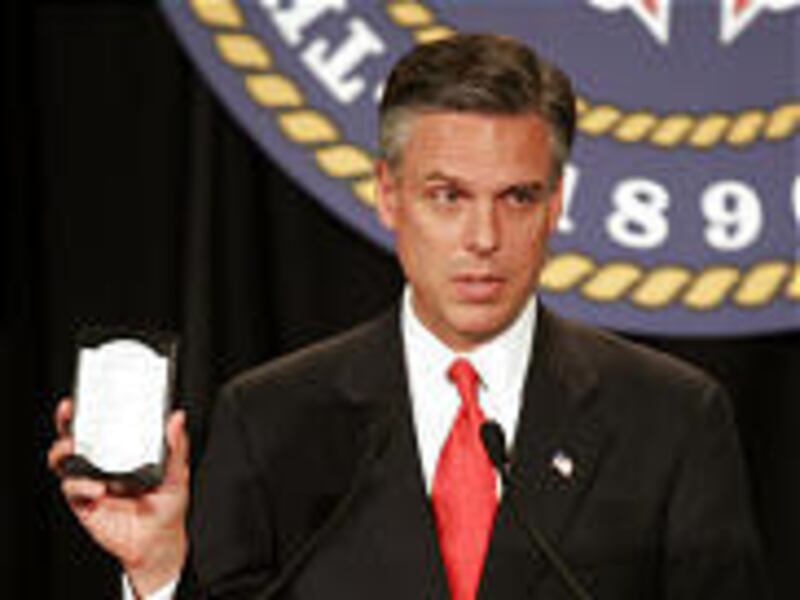BORDER="0">
BORDER="1"> FACE="Verdana,Helvetica,Arial"
SIZE="2">Additional information
FACE="Verdana,Helvetica,Arial" SIZE="2">
Gov. Jon Huntsman's
FILLMORE — Gov. Jon Huntsman Jr. promised Tuesday to continue to focus on four "common-sense fundamentals" during his first State of the State address, delivered in Utah's territorial capitol.
More than 150 lawmakers, state officials and others gathered in the stately stone building for the half-hour speech that touched on economic revitalization, education, quality of life and governance.
Huntsman surprised some by suggesting that hotter levels of nuclear waste could be banned from Utah once and for all during this session of the Legislature.
"My position on this is clear: B and C waste will not be dumped in Utah," the governor said, adding that by the time the session is over, "we should no longer be discussing the possibility" of the hotter waste coming to Utah.
Huntsman emphasized economic development, just as he did during his campaign. "When it comes to economic development, treading water will not be acceptable in my administration," he said.
Tax reform, the governor said, will create "an environment of opportunity" that will help raise Utah wages. He reiterated his call for a change in the formula used to calculate corporate income taxes, eventually eliminating them altogether.
"The last time we had a major revision in the tax code was 1959 — before I was born," the 44-year-old leader said. "It is time for a change."
Also on his agenda is raising the salaries of schoolteachers and state workers. Elementary school teachers would also receive an additional $300 for classroom supplies, Huntsman said.
Ethics reform — at least for the executive branch — also earned a place in the speech. That includes full disclosure, campaign-finance reform and a mandatory, one-year cooling-off period before the governor's appointees can become lobbyists.
The only prop Huntsman relied on was a laminated card listing his priorities. "Each one of these priorities has purpose in helping shape our tomorrow, each a reminder of our common destiny."
 |
He also spoke briefly about choosing to give his annual speech outside of Salt Lake City. Usually, it's delivered in the state Capitol, but it is closed for renovations. The reason Huntsman was in Fillmore, however, has more to do with his family's roots and his effort to reach out to rural Utah.
The governor was interrupted by applause just five times during his speech — twice during the portion dealing with halting hotter nuclear waste. That's less than is typical of a State of the State address. Huntsman said he had hoped for more applause but may not have left his audience enough time to clap.
The waste statement also brought applause from Jason Groenewold, director of HEAL (Healthy Environment Alliance of Utah). He called the governor's statements encouraging but still wonders why Huntsman hasn't signed an executive order to that effect.
"What I'm concerned about is that in 45 days, if the Legislature doesn't take formal action, and the governor hasn't issued an executive order . . . then the issue is going to be the monkey on Utah's back for centuries to come," he said.
Envirocare, a western desert firm licensed to handle low-level Class A radioactive waste, has an application pending to import "hotter" B and C wastes, which it says it has not pursued in years. The company is being sold; Huntsman chief of staff Jason Chaffetz told the Deseret Morning News Class B and C wastes prohibition would be done with the agreement and understanding of the new owners.
Envirocare senior vice president Tim Barney said the company respects the governor's positions, which were made clear during Huntsman's campaign.
Legislative leaders on hand for Huntsman's speech said they were pleased with what they heard, but Senate President John Valentine, R-Orem, and House Speaker Greg Curtis, R-Sandy, said there were some areas they wished the governor had spent more time talking about, such as transportation.
The governor did mention the controversial Legacy Highway project in Davis County. "Let's build it," he said, calling for promises to be kept. And, Huntsman said, the same goes for commuter rail. But the legislative leaders said they wanted more specifics.
"You can't have too many ideas out there or you can't get anything done," Huntsman said after the speech while passing out hamburgers and fries to lawmakers and other well-wishers at a local fast-food restaurant.
Human services and colleges and universities weren't singled out in the governor's address. Ron Stromberg, acting director of the Department of Human Services, said Huntsman's budget "does mention human services and speaks for itself" with a whopping $20 million increase.
But Rich Kendell, commissioner of the Utah System of Higher Education, hopes encouraging higher education and investing in research and development can become a central part of Huntsman's economic development plans. Such investments have been key in other states' economic recovery plans, he said.
"We're hopeful he will work with us on a plan that will make these things a reality," Kendell said.
When it came to the governor's discussion on ethics reform, lawmakers said they supported making changes in the executive branch but wanted to see any specific proposals aimed at legislators before commenting.
House Minority Leader Ralph Becker, D-Salt Lake, said Democrats have already advocated much of what the governor outlined over the years. "Good ideas are not for one party," Becker said.
Although there had been "some grumbling" among lawmakers about having to make the trip to Fillmore, Valentine said it was worth it. He introduced the governor's speech, carried live on television, calling Huntsman the "governor and my friend."
Contributing: Jennifer Toomer-Cook
E-mail: lisa@desnews.com




